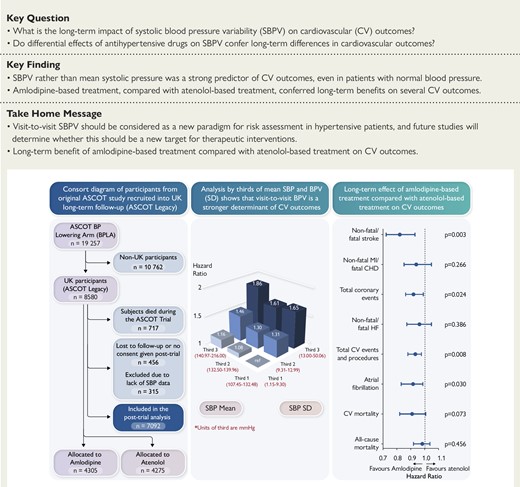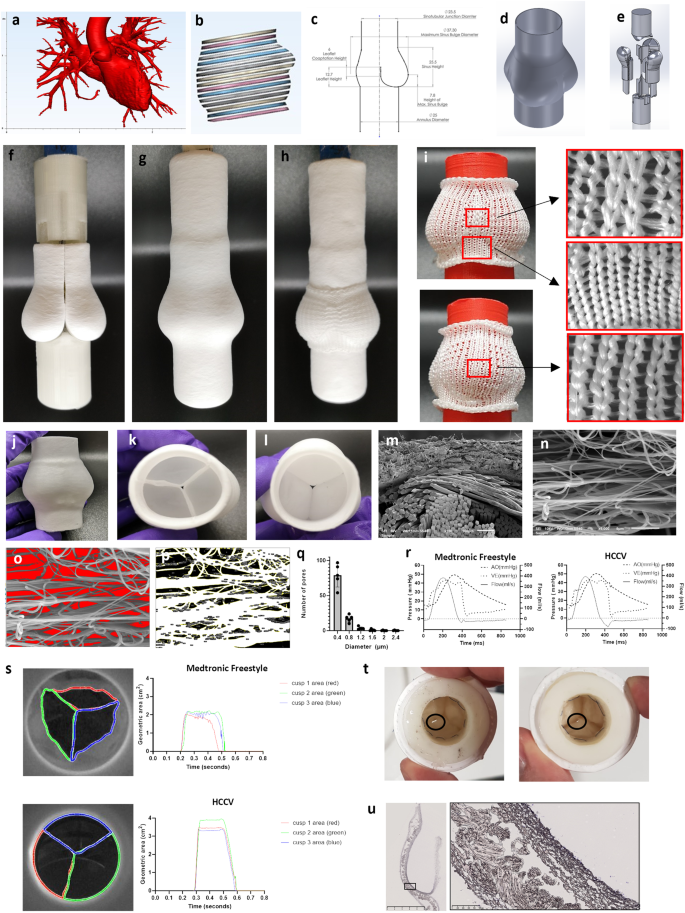2024-01-31 インペリアル・カレッジ・ロンドン(ICL)
◆20年以上にわたり8000人以上の英国の高血圧患者を対象に行われた研究では、収縮期血圧の変動が脳卒中、心臓発作、心房細動の強力な予測因子であり、高い血圧変動が低いから高いまでのすべての平均血圧レベルでリスクを強く予測したことが示されました。研究チームは、患者の血圧測定だけでなく、診察ごとの変動に焦点を当てて医学ガイドラインを変更し、リスクを低減させるよう呼びかけています。
◆同研究は、アムロジピンと呼ばれる一つの血圧薬が血圧変動を低減し、リスクを減少させるのに有効であることも示唆しています。
<関連情報>
- https://www.imperial.ac.uk/news/251055/blood-pressure-variability-major-predictor-heart/
- https://academic.oup.com/eurheartj/advance-article/doi/10.1093/eurheartj/ehad814/7590543?login=false
心血管イベントに対する血圧治療の遺産的利益は主に血圧変動の改善によって媒介される:ASCOT試験 Legacy benefits of blood pressure treatment on cardiovascular events are primarily mediated by improved blood pressure variability: the ASCOT trial
Ajay Gupta, William N Whiteley, Thomas Godec, Somayeh Rostamian, Cono Ariti, Judith Mackay, Andrew Whitehouse, Leila Janani, Neil R Poulter, Peter S Sever …
European Heart Journal Published:31 January 2024
DOi:https://doi.org/10.1093/eurheartj/ehad814
Abstract
Background and Aims
Visit-to-visit systolic blood pressure variability (BPV) is an important predictor of cardiovascular (CV) outcomes. The long-term effect of a period of blood pressure (BP) control, but with differential BPV, is uncertain. Morbidity and mortality follow-up of UK participants in the Anglo-Scandinavian Cardiac Outcomes Trial-Blood Pressure-Lowering Arm has been extended for up to 21 years to determine the CV impact of mean systolic blood pressure (SBP) control and BPV during the trial, and amongst those allocated to amlodipine- and atenolol-based treatment.
Methods
Eight thousand five hundred and eighty hypertensive participants (4305 assigned to amlodipine ± perindopril-based and 4275 to atenolol ± diuretic-based treatment during the in-trial period (median 5.5 years) were followed for up to 21 years (median 17.4 years), using linked hospital and mortality records. A subgroup of participants (n = 2156) was followed up 6 years after the trial closure with a self-administered questionnaire and a clinic visit. In-trial mean SBP and standard deviation of visit-to-visit SBP as a measure of BPV, were measured using >100 000 BP measurements. Cox proportional hazard models were used to estimate the risk [hazard ratios (HRs)], associated with (i) mean with SBP and BPV during the in-trial period, for the CV endpoints occurring after the end of the trial and (ii) randomly assigned treatment to events following randomization, for the first occurrence of pre-specified CV outcomes.
Results
Using BP data from the in-trial period, in the post-trial period, although mean SBP was a predictor of CV outcomes {HR per 10 mmHg, 1.14 [95% confidence interval (CI) 1.10–1.17], P < .001}, systolic BPV independent of mean SBP was a strong predictor of CV events [HR per 5 mmHg 1.22 (95% CI 1.18–1.26), P < .001] and predicted events even in participants with well-controlled BP. During 21-year follow-up, those on amlodipine-based compared with atenolol-based in-trial treatment had significantly reduced risk of stroke [HR 0.82 (95% CI 0.72–0.93), P = .003], total CV events [HR 0.93 (95% CI 0.88–0.98), P = .008], total coronary events [HR 0.92 (95% CI 0.86–0.99), P = .024], and atrial fibrillation [HR 0.91 (95% CI 0.83–0.99), P = .030], with weaker evidence of a difference in CV mortality [HR 0.91 (95% CI 0.82–1.01), P = .073]. There was no significant difference in the incidence of non-fatal myocardial infarction and fatal coronary heart disease, heart failure, and all-cause mortality.
Conclusions
Systolic BPV is a strong predictor of CV outcome, even in those with controlled SBP. The long-term benefits of amlodipine-based treatment compared with atenolol-based treatment in reducing CV events appear to be primarily mediated by an effect on systolic BPV during the trial period.
Structured Graphical Abstract

Blood pressure variability and blood pressure control in the 20-year follow-up of the ASCOT Legacy Study. BPV, blood pressure variability; SBP, systolic blood pressure; CHD, coronary heart disease; CV, cardiovascular; HF, heart failure; MI, myocardial infarction; SD, standard deviation.

